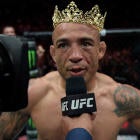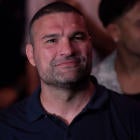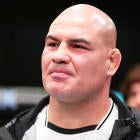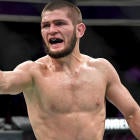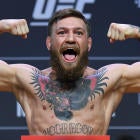During the brief time casual fans have had to get to know Derrick Lewis between his miraculous UFC 229 knockout of Alexander Volkov and his meteoric launch into Saturday's heavyweight title shot, it's the quick wit and self-deprecating humor that has been his calling card.
Lewis (21-5, 1 NC), who will challenge Daniel Cormier in the main event of UFC 230 card at New York's Madison Square Garden, had his full charm on display during Thursday's media day. Citing his dislike for interviews as the reason for his often colorful responses, Lewis broke down what the future might look like should he shock the world and upset the two-division champion Cormier (21-1, 1 NC) following a 28-day turnaround.
"If I'm the champion, the whole UFC division should be ashamed of themselves for a guy that had no damn skills being the champion," Lewis said. "They should all just go relocate somewhere.
"Have you seen my fights? Have you seen my technique? Shit, I ain't shit."
Lewis, who is far from miscast as UFC's lovable clown prince, saw his tone get a bit more serious when pressed about why he fights. After admitting he could care less about titles, headlining roles and adoring fanfare, Lewis was nothing short of blunt in revealing his motives.
"It would be great if people forget about me next week," Lewis said. "I don't care if I am ever remembered in this sport for anything. I'm not in the sport for that. I'm just in it to take care of my family. It's a job for me.
"I promise you, I'm only doing this for the paycheck, that's it. If I was really trying to be the best fighter in the world, I would be in the best shape and taking it more serious but I'm not."
With his trademark honesty flowing and the comedic curtains he often puts up to protect the real person deep inside temporarily drawn, Lewis suddenly began to dig much deeper in explaining how the fighting heart inside this relentless slugger was first formed. The more Lewis shared, the easier it became to realize how much pain and regret had been a central theme in the foundation of what has become a remarkable personal transformation.
If anger is the fuel that Lewis, 33, admits he draws upon most inside the Octagon in order to become a knockout machine, it's a stored emotion he first collected as the second oldest of seven siblings raised by his single mother in New Orleans.
"It was hard, it was tough," Lewis said. "Just watching my mom getting abused everyday and not being strong enough to pull my stepdad off of her. It was real tough. That's what I think about on fight night, not being strong enough or good enough to get my stepfather off of my mom and just watching them fight for damn near hours."
When Lewis was 13, his family packed up and fled to Houston in order to run from the abusive situation. But despite his new surroundings, Lewis' troubled upbringing only continued and evolved into a life of street fighting and trouble.
Two weeks after his high school graduation, a 19-year-old Lewis would embark on a chain of events that would forever alter his life. An aggravated assault arrest, which saw his victim lose sight in one eye, led Lewis to a lengthy probation sentence. Two years later, after receiving a full scholarship to play football at Kilgore College (Tx.), Lewis violated his probation and went on to serve nearly four years in prison.
"I wouldn't be here today if I didn't go through the stuff I went through in my life," Lewis said.
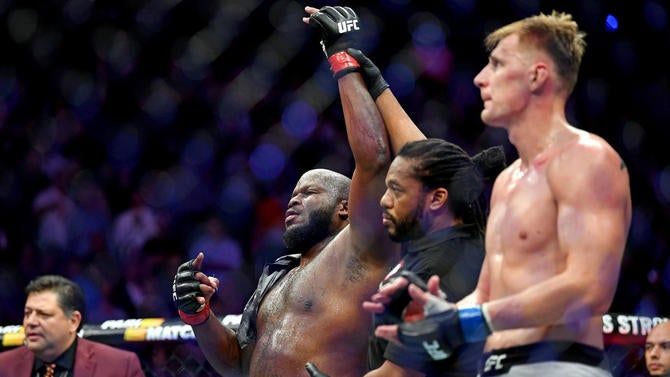
Still ravaged by anger due to the direction his life turned, Lewis describes his time in jail as "real dark." It's a period only made harder by the fact that he was denied parole multiple times.
Thinking back on his emotions at the time, however, Lewis doesn't hesitate to admit how valuable each denial was at forcing him to change his life.
"My first time, my mind was still on some crazy stuff and getting out and getting some revenge," Lewis said. "Whenever they told us that I couldn't go home, I sat down and really had the anger built up in me. Then when they denied me the second time, then I really sat down and really had to change my thinking and my life and planning stuff that I need to be doing better when I get out.
"I made my third parole and I believe if I had made it the first time, I wouldn't be here today. I still would've been out there doing stupid stuff."
Lewis, who had toyed with the idea of becoming a boxer when he was 17, said he used the isolated time in jail to build the willpower and stubbornness he now relies on as a fighter who can never be counted out until time has expired, which is a trait he relied on in so dramatically finishing Volkov to violently end a fight he lost nearly every second of.
Upon his release from prison, following a short period in which he was managed and mentored by former heavyweight boxing champion George Foreman, Lewis decided to switch sports altogether and give all of his attention to mixed martial arts.
Lewis now calls MMA his personal release and the only avenue in his current life as a married father of three kids where he allows the deep-rooted anger that's still in him to come to the surface. Even today, each time he enters the cage, he allows himself to transform back into the helpless child in Louisiana unable to overpower the source of his pain.
"I carry all of that into every fight that I have ever been in," Lewis said. "That's what really gets me going because of my past. I think about all the tough times and the bad times that I had in my life and I bring them with me into the Octagon only because it's kind of hard to go in there and fight someone who didn't do anything to you. So you really have to find some kind of mental edge on your opponent.
"It would be great if I could be a role model and an inspiration for people who have been going through things that I already have. To let people know that it doesn't matter what type of background you have or what happened in your past that you can still be something and make something in your life."
Regardless of whether he pulls the upset against Cormier, there's little question how Lewis has already won simply getting this far.














